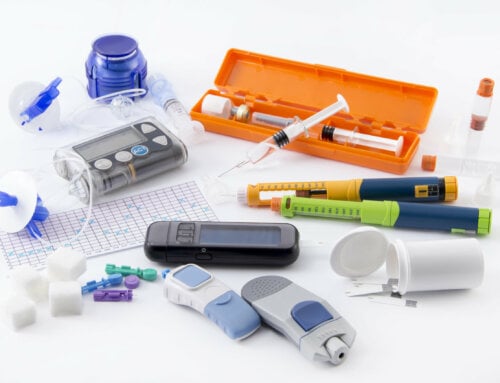According to the FDA, 2/3 of Americans have expired medication in their cabinets at any given time. Only 42% of Americans clean, organize and restock their medical prescriptions and OTC supplies on a yearly basis. Another alarming statistic is that only 80% of Americans clean out expired foods from their refrigerators. Now that we are in spring, there is never a better time to look around your house and make it a safer home for everyone. Here are 5 spring cleaning tips to consider:
1. Start With the Bathroom Medicine Cabinet
If you do store blood glucose testing supplies or prescription medications in the bathroom, make an immediate change. The bathroom has the most heat, humidity and concentrated light source of any room in the house and influences these products; they can decompose. Always keep glucose testing strips in their original container for best results. Dispose of expired prescription medications (you can check with your pharmacist if you have questions about future potency) in the correct manner. Do not flush them in the toilet or sink as they can enter your water supply. Check with your pharmacy or local health department to educate yourself about correct disposal where you live.
Store products in the original container so that there is no confusion in the house. Always, store all medications away from children’s reach. Think about putting your medications, vitamins and supplements in a kitchen cabinet. Now is a good time to share all vitamins and supplements with your health care professional as they may interact with your prescription medications. Get your prescription drugs on an automatic renewal program so you never run out. Restock products like first aid supplies, band-aids, aspirin, Tylenol, and non-steroidal anti-inflammatories such as Advil, Aleve, or Motrin. Include hot and cold packs for injuries. Purchase Biofreeze, Tiger Balm or another OTC product to relieve routine, muscle soreness. Keep OTC stomach aids including Pepto-Bismol, Alka-Seltzer, Tums, Prilosec, or Imodium for basic stomach upsets. Have sugar-free cough syrup and sugar-free throat lozenges for a simple sore throat or cough. Buy soothing eye drops for spring allergy season. Add a digital thermometer to check your temperature. Purchase gauze, sterile 2×2’s, antibiotic ointment, cortisone cream for small injuries and Benadryl or Zyrtec for allergies. Be prepared for insect bites as well as sunburn. Buy new sunscreen with 30 SPF or higher and insect repellent, both of which should be changed out annually. Change toothbrush heads after 3 months, after a cold or flu or after a dentist visit. Check body, face creams and even perfume or cologne for color and fragrance change. These products do not last indefinitely. Women need to check makeup as well and refresh in the spring.
2. Change Your Medications
Talk to your physician or pharmacist about changing to generic medications this spring. Generic drugs are “created to be the same as the already marketed brand name drug in dosage, safety, strength, route, quality, performance and intended use.” Recent years have allowed for many medications to continue to come “off patent”, which means other companies can produce them at a huge discount and pass the savings on to you. Some popular medications which now generic formulations are include Actos (diabetes), Lipitor/Crestor (cholesterol), Plavix (blood thinner), and Singulair (asthma). Metformin, the most commonly used oral diabetes medication has been offered in a generic for years. Some chain stores will even give you Metformin for free. Most generics offer you all the same benefits as their counterparts but do check with your physician. Many medications now come in combination pills and while more convenient to take, they may come at a higher price. During your appointment, mention that cost is a factor if they prescribe a new medication. Consider a local pharmacy but stick to chain pharmacies if you travel often since you may need a medication re-fill in another state. A local pharmacy may have more flexibility to lower prices compared to a chain store. Many big pharma companies now offer individual saving cards to their patients. Be careful, but do check online for cheaper medications but remember that this may be risky. Spring is a good time of year to update your medication list and make a copy for your wallet, the refrigerator door, and the glove compartment of the car. Add your allergies, surgeries, medical conditions as well as emergency phone numbers. Invest in a medical ID bracelet or necklace if needed.
3. Remember the Basics of Hand Washing
Always consider the old standby – soap and warm water. According to the CDC, “handwashing is still the best way to reduce the number of microbes.” A study published in Clinical Infectious Diseases compared 27 hand cleaning sanitizers with soap and water. The result was that there was no hand sanitizer that did better as far as removing more bacteria or spreading disease compared to regular soap and water. Hand sanitizers do not eliminate all types of germs and do not remove grease or visible dirt. Wash hands for a minimum of 20 seconds and you should remove all jewelry when washing. Dry with a fresh towel or clean paper towel for best results. In a pinch, you can use alcohol-based products that contain 60-70% alcohol and have a moisturizer included but be aware that alcohol dries out your skin. Make sure to use a quarter size amount, rub for 20 seconds especially between fingers. Hand washing is the single best thing to prevent sharing an illness and keep you healthy.
4. Spring Clean in the Kitchen

5. Open Those Windows!
Spring is the best time to open windows and get fresh air into the house, unless you have severe allergies to pollen. Consider air filters to eliminate pollutants, either a centralized or portable system if you can’t let fresh air in. Things like dust, dust mites, bacteria, viruses, and animal dander can linger in the house and on hard surfaces. House plants can also help you breathe easier.
Added tips for spring cleaning:
Have couches or any upholstered furniture, drapes, blinds, curtains, carpeting and area rugs deep cleaned. This has been a household tradition for years. Change out slip covers to lighter fabrics.
Use a Hepa-filter in the vacuum for extra dust and dander removal. There are intricate systems that include ionic air filters, smoke air purifiers, UV air purifiers, specific allergy air filters and electrostatic air filters to help purify your home.
Consider hypoallergenic bedding and pillows to help you breathe easier at night. Remove frilly and decorative pillows from the bed where more dust mites hang out. Buy a pillow that can easily be thrown into the washer and dryer to remove dust. Purchase a hypoallergenic mattress cover, since dust mites accumulate in the mattress especially in warm, damp and humid weather. Get rid of feather pillows if you are allergic to them. Remove shoes at the door and put on slippers to leave dirt and dust outside, not in your house. Damp dust with either vinegar or plain water instead of dry dusting which pushes dust from one area to another. This will minimize dust distribution. This will make cleaning much easier. Dust or vacuum ceiling fan blades on a weekly basis.
Always keep fans running in the bathroom to dry out moisture and humidity. This will help decrease the production of mold and mildew. Use a squeegee on the shower glass before exiting to help prevent mildew formation. Open windows for fresh air and run ceiling fans if you do not have allergies.
Use mostly natural cleaning products including lemon juice, baking soda, rubbing alcohol, peroxide and vinegar over commercial cleaners to reduce endocrine disruptors. There is mounting evidence that these products may affect our respiratory, hormone and skin health. Wear rubber gloves when cleaning to avoid hand rashes or skin dryness.
Be careful when mowing and pruning your lawn. Check lawn equipment in the spring to make sure it is safe and in proper working condition. Plant beautiful and fragrant flowers. Wear a hat, sunscreen, sunglasses and proper shoes when doing outside work.
Spring is a wonderful time of year to make some positive changes. Start your cleaning today so you can enjoy summer!
Have a question or comment? Then post below, no registration required. I would love to hear from you!
NOTE: Consult your Doctor first to make sure my recommendations fit your special health needs.







Leave A Comment